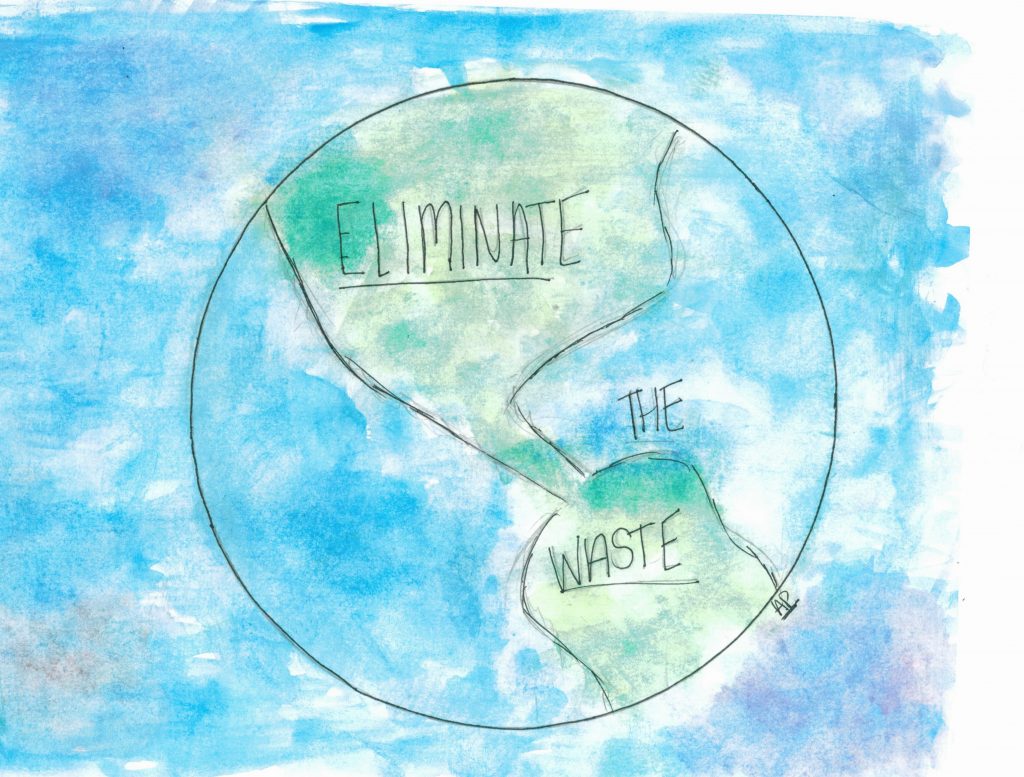“Reduce, Reuse, and Recycle” – this is a common phrase many students have definitely heard before. The environmental motto is emphasized in school from a young age, and for good reason. The three Rs are crucial for the salvation of our environment. Plastic is used too liberally and is causing overwhelming pollution. Unnecessary use and manufacturing of plastic and other materials also wastes energy and resources and increases greenhouse gas emissions that contribute to global climate change.
RHS is a place that always tries to promote new ways to help our local community as well as the Earth. Since reducing, reusing, and recycling is so important, it would be interesting to gain insight into the ways RHS manages the three Rs.
Fortunately, RHS consistently promotes recycling. Several students point out that throughout the school there are posters that encourage recycling and “going green.” There are also water fountains and water bottle refillers in every hallway. This way, students don’t have to buy several plastic water bottles per day and they can save a significant amount of plastic overall. As a matter of fact, on each water fountain, students can see how many water bottles they have saved by using the filler. Plus, in each bathroom, there are more hand dryers than paper towels, which contributes to the reduction of waste. Additionally, there are recycling bins throughout the hallways. In many aspects, RHS makes obvious efforts to reduce, reuse, and recycle.
On the other hand, many students and teachers argue that RHS could do a lot more to help the environment. Mr. Luo, an Environmental Science teacher and advisor for the Students for Environmental Action Club, states that the main problem is contamination. “We often see plastic bottles and other random items in these bins, and these cannot be mixed. This forces the collector to fish through the bags and remove these items. Collection should be a simple job, but this type of contamination makes it unnecessarily more difficult (and often, gross)… the custodians understandably are not going to be willing to take the time to go through all of our trash. Ultimately, this will just end up in the trash,” he states.
It is very easy for contamination to affect RHS. Specifically, coffee is a popular cafeteria item that students buy in the morning. Creamer comes in small plastic packages and sugar comes in small paper packages. There are also other disposable items that students purchase everyday. Anything and everything is put into a black bin which is thrown into the garbage. Many argue that this system should be changed to be less wasteful. A common complaint among students is that recycling bins are neither frequent nor clear enough. Jocelyn Pires, a junior at RHS, says, “Bins should be more clear. I think we need to be more specific. We should have recycling bins pop up more frequently in the hallways because there are more garbage cans.” Another junior at RHS, Karina Wagner, agrees. She says, “I think that we should make more designated bins and cans for paper and recyclable goods because I feel like it’s easier to just throw everything away rather than putting stuff in the right bins.” Karina also addresses the “R” that most people tend to forget: Reduce. “We should use less paper. We should have teachers upload large packets online instead of printing them.” She is shedding light on an incredibly important aspect of this issue: the system begins with reduction. If we can reduce the amount of paper we use in class, the amount of plastic we use in the cafeteria, and the amount of anything else that may be contributing to overuse of goods, we will be making a drastic difference.
On one hand, some students believe that RHS does not recycle. Some have commented that the school has designated bins but at the end of the day it seems like everything is put into the garbage. However, Mr. Luo asserts that this claim is untrue. “Contrary to what some students believe, RHS does recycle, which is obviously a good thing, but I think that patting ourselves on the back just for recycling is a fairly low standard. We do have a recycling dumpster outside and whatever we collect will be picked up by the town. We also have a program called TREX which collects soft plastics to make into construction materials. There are boxes around the school that students and faculty can place soft plastics (like plastic bags) into. Last year, we collected 450 pounds, which is impressive!” Luo says.
Students can also make a difference in school-related reduction, reuse, and recycling. As a matter of fact, the Green Club is actively trying to make a difference in bin labeling and frequency. Taking notes online eliminates a significant amount of paper being thrown away. Students can also bring refillable water bottles to school. Although some students complain that the bins aren’t indicated well enough, they can make a more conscious effort to determine which bin is the recycling bin until the labeling is improved. If students themselves can spread awareness of and care for the three Rs to their peers, a difference is more likely to be made.
Ideally, RHS can be a model for other schools across New Jersey. If we treat our environment right, other places will learn from this and follow. Together, we can make a difference.
Alana Kerner
staff writer
Graphic: Ariya Patel

